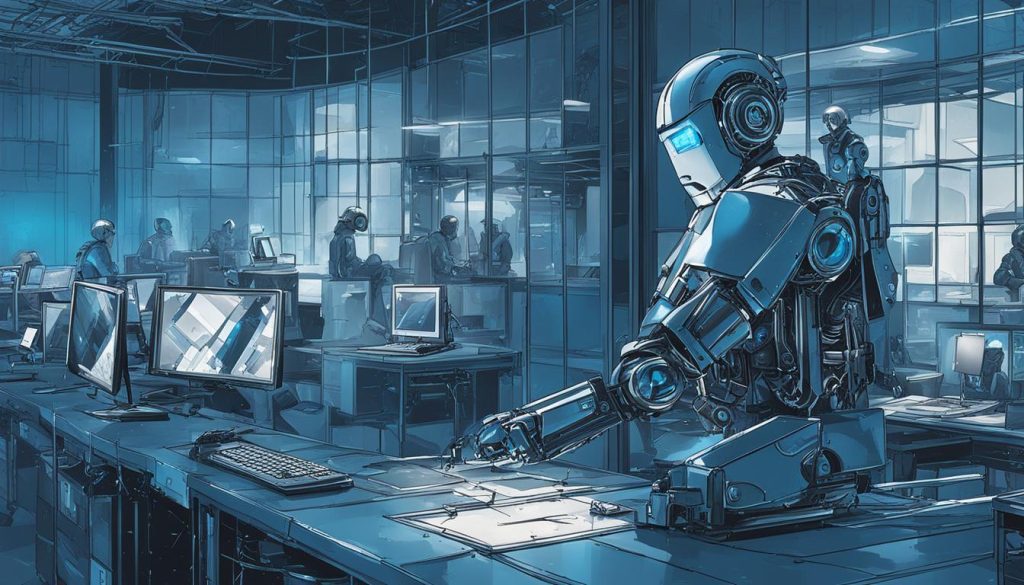Will artificial intelligence (AI) render all jobs obsolete by 2030? The concern for job security in the face of increasing automation is a pressing issue in today’s workforce. It is essential to understand the real impact of AI on employment and prepare for the future job market.
According to the McKinsey Global Institute, up to 30 percent of current work hours across the US economy could be automated by 2030. However, the introduction of generative AI is expected to enhance the way STEM, creative, and business and legal professionals work, rather than completely eliminating their jobs. While office support, customer service, and food service employment may continue to decline, it is estimated that approximately 12 million occupational transitions may be needed by 2030, with workers in lower-wage jobs being up to 14 times more likely to change occupations than those in higher-paid positions.
Key Takeaways:
- AI will enhance certain professions rather than eliminating them.
- Low-wage workers are more likely to need to change occupations.
- Workforce development and expansive hiring approaches are necessary to address job market challenges.
The Accelerating Pace of Job Automation
The rise of artificial intelligence has led to the accelerating pace of job automation. According to a report by Forrester, it is predicted that 2.4 million US jobs will be replaced by generative AI by 2030. This rapid advancement in AI technology has significant implications for the future of work and job security.
White-collar workers, especially those with salaries over $90,000, face the highest risk of job replacement. Professions in the legal, scientific, and administrative fields are identified as particularly vulnerable to automation. AI has the ability to automate routine tasks and data analysis, which are central to many white-collar jobs.
However, it is important to note that while AI may replace some jobs, it will also lead to net job creation over the long run. Many roles will evolve rather than being completely replaced. As AI technology advances, it will create new opportunities for skilled workers who can augment and collaborate with AI systems.
Which Jobs Are Safe from AI?
While AI is expected to automate a significant number of jobs, there are certain careers that are considered to be more resistant to AI. Blue-collar professions in construction and transportation are less likely to be affected by job automation. These jobs require physical skills and specialized knowledge that AI struggles to replicate.
Additionally, creative professions such as poets, writers, and editors are also less likely to have their jobs completely replaced by AI. The creativity, emotional intelligence, and critical thinking skills involved in these roles are uniquely human and not easily replicable by AI algorithms.
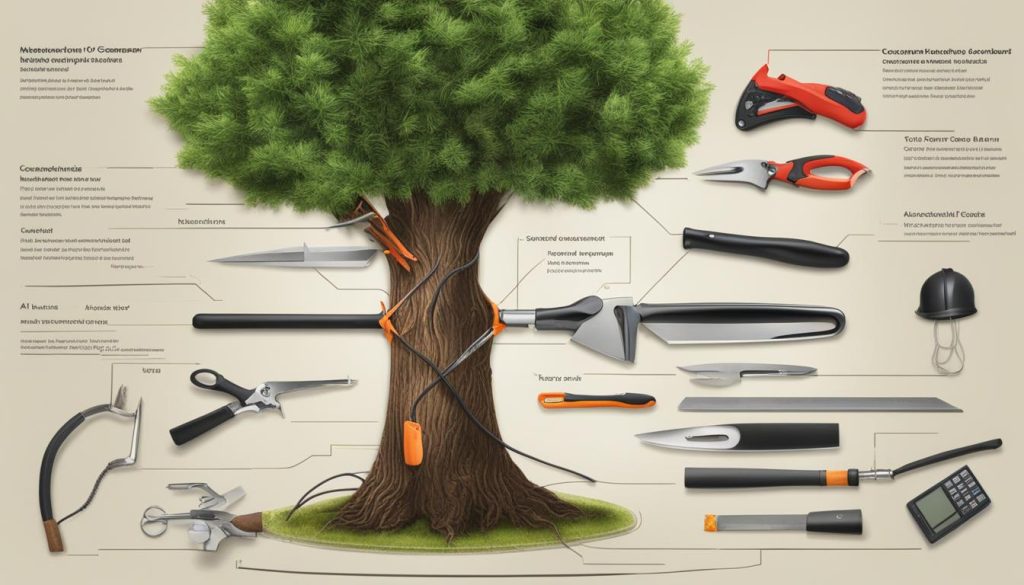
However, even in AI-resistant careers, it is important for workers to adapt and acquire new skills to remain competitive in the evolving job market. While AI may not replace these jobs entirely, it can still augment and improve the work done by professionals in these fields. Therefore, it is crucial for individuals to stay updated on technological advancements and develop complementary skills to enhance their job security.
Dissecting the Job Market Shift: Pre and Post-Pandemic
The COVID-19 pandemic has had a profound impact on the job market, causing significant shifts in employment patterns. As businesses faced closures, restrictions, and economic challenges, millions of workers experienced occupational changes. This section examines the job market shift, focusing on the pre-pandemic and post-pandemic landscapes, and the lasting effects of COVID-19 on employment.
During the pandemic, the US labor market witnessed 8.6 million occupational shifts as individuals sought different opportunities due to changing circumstances. Many workers in sectors such as food services, in-person sales, and office support were compelled to explore new avenues for livelihood. This unprecedented disruption in the job market highlighted the need for adaptability and resilience among workers.
The pandemic also accelerated certain trends in industries like e-commerce and remote work. With physical interactions limited, businesses and consumers increasingly turned to online platforms for transactions and services. As a result, the demand for jobs related to digital platforms, logistics, and remote collaboration surged.
By analyzing the pre-pandemic and post-pandemic job market, we gain insights into the long-term impact of the pandemic on employment. It allows us to understand the changes in industry dynamics, the rise of remote work, and the transformation of traditional job roles. The COVID-19 pandemic has driven organizations and individuals to adapt and innovate, reshaping the job market for years to come.
All Jobs Will Be Gone by 2030: Separating Myth from Fact
While there are concerns about all jobs being gone by 2030, data from economic think tanks suggests a more nuanced reality. Generative AI is expected to enhance the way certain professions work rather than eliminating jobs outright. The impact of AI on different industries will vary, with some industries more prone to automation than others. It is important to analyze upcoming job market trends to understand the future of work and employment prospects in the AI era.
What the Data from Economic Think Tanks Shows
Economic think tanks, such as the McKinsey Global Institute, have conducted extensive research and analysis on the impact of AI on the job market. These studies provide valuable insights into the potential effects of AI on different sectors and occupations. The data shows that while automation may result in job displacement in some industries, it also presents opportunities for new roles and career paths.
By examining the data, we can gain a better understanding of which industries are most likely to be affected by AI and which ones are expected to experience growth. This information can help individuals and organizations make informed decisions about their future career paths and business strategies.
Understanding AI’s Impact on Different Industries
AI has the potential to revolutionize various industries, but its impact will differ depending on the nature of the work involved. Some industries, such as manufacturing and transportation, have already experienced significant automation due to AI technologies. On the other hand, industries that require complex decision-making, creativity, and interpersonal skills are expected to see less disruption.
“AI will complement, rather than replace, human capabilities. It will augment our abilities and free us from repetitive and mundane tasks, allowing us to focus on higher-value activities that require human intelligence.”
As AI continues to evolve, it is crucial for professionals in all industries to stay informed about the latest developments and adapt their skills accordingly. By embracing AI technologies and acquiring new abilities, individuals can position themselves for success in an AI-driven job market.
Upcoming Job Market Trends
As we move closer to 2030, several job market trends are expected to emerge. These trends will be shaped by advancements in AI, changing consumer behaviors, and global economic shifts. Some key predictions for the future of work include:
- An increased demand for AI specialists and data analysts
- A rise in remote and flexible work arrangements
- The growth of gig economy and freelance opportunities
- The need for continuous learning and upskilling
By staying ahead of these trends, individuals can adapt their skills and explore new avenues for employment. Embracing the future of work means being open to change and seizing opportunities that arise in an evolving job market.
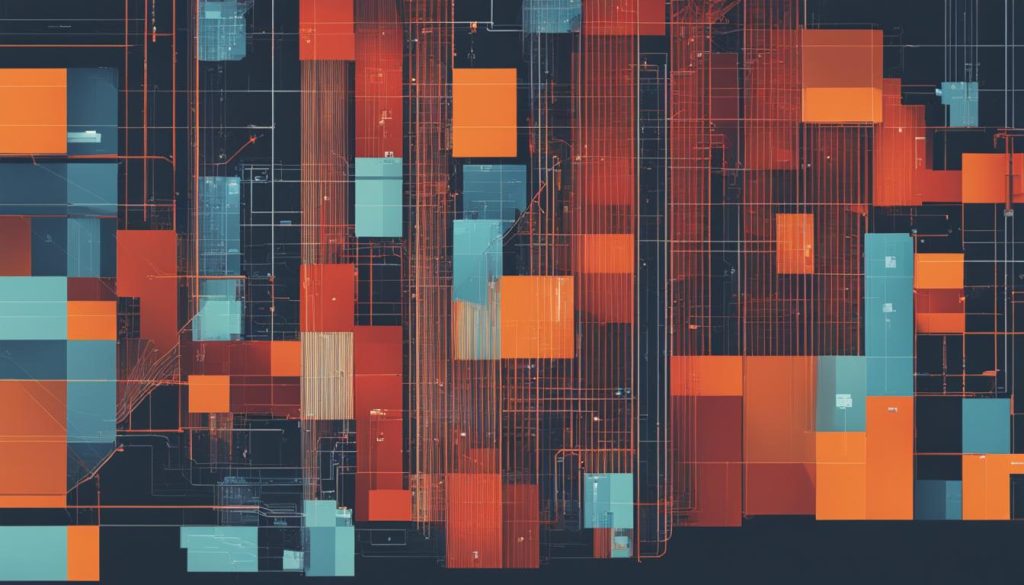
| Industry | Predicted Impact of AI |
|---|---|
| Manufacturing | Significant job displacement due to automation |
| Healthcare | Increased demand for AI-assisted diagnosis and treatment |
| Finance | Streamlined processes and new roles in data analysis and cybersecurity |
| Creative industries | Less susceptible to automation due to the unique human touch |
The table above provides a snapshot of industry-specific predictions regarding the impact of AI. While some sectors may experience job displacement, others will see the emergence of new roles and opportunities. It is crucial for individuals to explore these trends and align their skills and career paths accordingly.
The Unsung Heroes: Jobs That AI Can’t Replace
In the age of AI, where automation threatens to replace numerous jobs, there are certain professions that remain resilient. These AI-resistant professions play a critical role in our society and are expected to thrive even in the face of technological advancements. Sectors such as healthcare, transportation, and creative industries are prime examples of industries that require the human touch, making them less susceptible to automation.
Sectors Thriving in the AI Era
One such sector is healthcare, where the personal connection between medical professionals and patients is irreplaceable. The empathy, compassion, and expertise demonstrated by doctors, nurses, and other healthcare providers cannot be replicated by AI. Similarly, transportation is another sector where human skills are paramount. Industries such as aviation and logistics rely on human decision-making, problem-solving, and adaptability in complex and dynamic situations.
Furthermore, the creative industries are areas where AI struggles to match the unique abilities of human creativity and imagination. Professions such as artists, writers, designers, and musicians require originality, emotion, and a deep understanding of human experiences. These creative professionals bring a unique perspective that cannot be replicated by AI algorithms.
Creative Professions: A Haven for Human Touch
Creative professions, in particular, provide a haven for the human touch in an increasingly automated world. Whether it’s crafting a compelling story, designing a visually stunning masterpiece, or composing a musical symphony, these professionals bring their unique talents and insights to create impactful and meaningful experiences. The intricacies of human emotion, nuance, and perception are areas where AI falls short, making creative professions inherently human-centric.
Not only do creative professions thrive in the AI era, but they also present a world of job opportunities. As technology advances, new avenues for creativity emerge, requiring skilled professionals to bring these ideas to life. The demand for innovative content, captivating designs, and engaging experiences continues to grow, providing a vast array of career options for those with artistic talents.
In summary, while AI may disrupt many jobs, certain professions continue to flourish and provide indispensable contributions to society. Sectors that rely on the human touch, such as healthcare, transportation, and the creative industries, offer job opportunities that combine technical expertise with the artistry and empathy unique to human beings.
Technological Advancements: Job Creation vs. Displacement
Throughout history, new technology has had a profound impact on job markets. While there is a concern that advancements in technology, particularly artificial intelligence (AI), may lead to job displacement, it is essential to recognize that technological advancements also create new job opportunities. The introduction of new technology can both replace and generate jobs, shaping the changing job landscape in the AI age.
History of New Technology Introducing New Job Markets
A historical examination reveals how new technology has consistently transformed job markets. For example, the agricultural revolution revolutionized farming practices, leading to increased productivity and the need for specialized agricultural jobs. Similarly, the advent of computers in the workplace created a demand for software developers, IT specialists, and data analysts, among other roles. These historical examples demonstrate the capacity of technological advancements to stimulate job creation and open up entirely new industries.
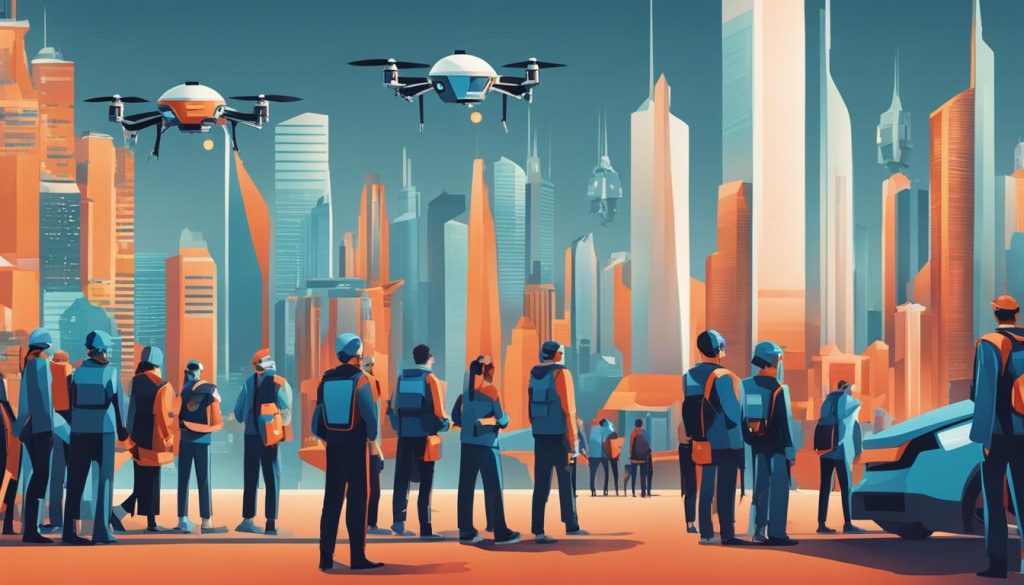
The Role of ‘New Collar’ Jobs in the AI Age
In the AI age, the emergence of ‘new collar’ jobs is shaping the job market. Unlike traditional jobs that heavily rely on formal degrees, new collar jobs prioritize skills and competencies. These roles often require specialized technical knowledge and hands-on experience, which can be acquired through vocational training, certifications, or apprenticeships. ‘New collar’ jobs bridge the gap between the expanding technological landscape and the changing needs of the workforce, providing opportunities for individuals to thrive in the AI age.
| New Collar Job | Description |
|---|---|
| Data Analyst | Extract, analyze, and interpret data to inform business decisions. |
| Cybersecurity Specialist | Protect computer systems and networks from cyber threats. |
| Robotics Technician | Install, maintain, and repair robotic equipment. |
| AI Ethicist | Address ethical issues related to AI technology and its impact. |
| Virtual Reality Designer | Create immersive virtual experiences and simulations. |
This table showcases a few examples of ‘new collar’ jobs in the AI age. These roles highlight the diverse range of opportunities available that require specialized skills and knowledge in emerging technologies.
By understanding the historical precedents of technology-driven job market shifts and embracing the opportunities presented by ‘new collar’ jobs, individuals can navigate the changing job landscape in the AI age. It is crucial to adapt, upskill, and seize the possibilities created by technological advancements, ensuring both job security and personal growth in this transformative era.
Investing in Skills Over Degrees: The New Employment Paradigm
The future job market requires a shift in focus from degrees to skills. Employers are increasingly valuing skills and competencies over formal education. This new employment paradigm emphasizes the importance of upskilling and reskilling to remain competitive in the evolving job market. Investing in skills that are in high demand can greatly enhance job security and career prospects in the digital age.

Strategies for Strengthening Job Security in the Digital Age
In the digital age, job security is a top concern for professionals as technology continues to advance and reshape the job market. To navigate this changing landscape, it is crucial to employ various strategies that can strengthen job security and ensure future job prospects. Here are some key strategies to consider:
- Continuous learning and acquiring new skills: In today’s rapidly evolving digital age, it is essential to continuously update your skills and knowledge. Stay current with industry trends, technological advancements, and emerging job market requirements. Seek out opportunities for professional development, certification programs, and online courses to enhance your skill set.
- Stay adaptable and flexible: Embrace a growth mindset and be open to adapting to new technologies and job requirements. Develop transferable skills that can be applied across industries and roles. Be willing to take on new challenges, learn new tools, and explore different career paths as the job market evolves.
- Build a strong professional network: Networking is a powerful tool for career growth and job security. Connect with professionals in your industry, attend industry events and conferences, join online communities and professional groups. Cultivate relationships with colleagues, mentors, and thought leaders who can offer guidance, support, and potential job opportunities.
- Embrace lifelong learning: Job security in the digital age requires a commitment to lifelong learning. Stay curious and continuously seek new knowledge and insights. Develop critical thinking, problem-solving, and creativity skills that are highly valued in the digital age. Embrace a mindset of constant growth and improvement to stay relevant in your field.
To illustrate the importance of these strategies, let’s take a look at the data:
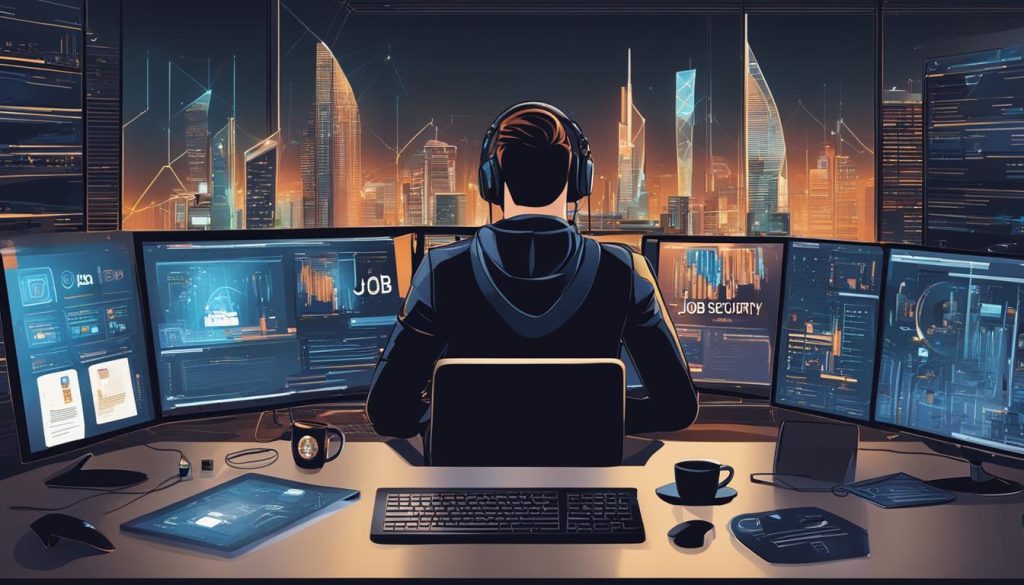
The image above reflects the increasing demand for skills and adaptability in the job market. As technology advances, employers are seeking candidates who can keep pace with the digital age and bring valuable skills to their organizations.
“Continuous learning is essential in today’s fast-paced digital world. By continuously updating your skills, staying adaptable, and embracing lifelong learning, you can enhance your job security and future-proof your career.” – John Smith, HR Specialist
By implementing these strategies, professionals can improve their job security, remain competitive in the digital age, and seize future job prospects. The key is to stay informed, adaptable, and proactive in navigating the ever-changing job market.
Conclusion
The impact of AI on jobs is a topic of intense debate and speculation. While there is legitimate concern about job automation, it is crucial to separate myths from facts in order to fully understand the impact of AI on different industries and professions. While it is true that certain jobs may be replaced by AI, it is equally important to recognize that new job opportunities will also emerge in the AI era.
To ensure job security in the digital age, individuals must invest in skills that are relevant and adaptable. By continuously learning and upskilling, individuals can stay ahead of the curve and remain competitive in the job market. The ability to adapt to new technologies and embrace the changing job landscape is key to securing employment in the AI age.
While the future of work may require individuals to constantly adapt and acquire new skills, it also presents tremendous opportunities. By staying informed about industry trends and technological advancements, individuals can position themselves to thrive in the AI era. The future of work is not about fearing job automation, but rather about leveraging AI as a tool to enhance productivity, efficiency, and innovation in various industries.
In conclusion, job security in the AI age is attainable through a proactive approach. By investing in skills, staying adaptable, and embracing the changing job landscape, individuals can navigate the challenges and opportunities presented by AI. The future of work demands continuous learning, but with the right strategies and mindset, individuals can not only secure their jobs but also unlock their full potential in a digitally-driven world.
FAQ
Will AI end all jobs by 2030?
No, AI is expected to automate certain jobs but will also create new job opportunities. The impact of AI on jobs will vary across industries.
How fast is job automation accelerating?
Job automation is accelerating due to the rise of artificial intelligence. A report predicts that 2.4 million US jobs will be replaced by AI by 2030.
Which jobs are safe from AI?
Blue-collar professions in construction and transportation, as well as creative professions, are considered to be more resistant to automation.
What is the impact of the COVID-19 pandemic on the job market?
The pandemic has caused significant shifts in the job market, with many people changing occupations. Certain industries, such as e-commerce and remote work, have seen accelerated growth.
Are all jobs really going to be gone by 2030?
No, data from economic think tanks suggests that job automation will be more nuanced. While certain jobs may be replaced by AI, new job opportunities will also be created.
What is the role of AI in different industries?
AI’s impact on different industries will vary. Certain industries are more prone to automation than others, and it is important to analyze industry-specific predictions.
What are the upcoming job market trends?
Understanding the future of work and employment prospects requires analyzing upcoming job market trends and the influence of AI on job creation and displacement.
Which sectors are thriving in the AI era?
Sectors such as healthcare, transportation, and creative industries are expected to thrive in the AI era as they require skills that are harder to replicate with AI.
What is the history of new technology introducing new job markets?
Throughout history, new technology has both created and displaced jobs. The introduction of computers in the workplace, for example, showcased the transformative impact of technology on job markets.
What is the role of ‘new collar’ jobs in the AI age?
‘New collar’ jobs, which require skills and competencies rather than traditional degrees, play a significant role in the changing job landscape in the AI age.
How can I strengthen job security in the digital age?
Continuous learning, adapting to new skills, building a strong professional network, and embracing lifelong learning are essential strategies for strengthening job security in the digital age.
Source Links
- https://www.mckinsey.com/mgi/our-research/generative-ai-and-the-future-of-work-in-america
- https://www.businessinsider.com/ai-radically-reshape-job-market-global-economy-employee-labor-innovation-2023-8
- https://tech.co/news/ai-replace-miilions-roles

